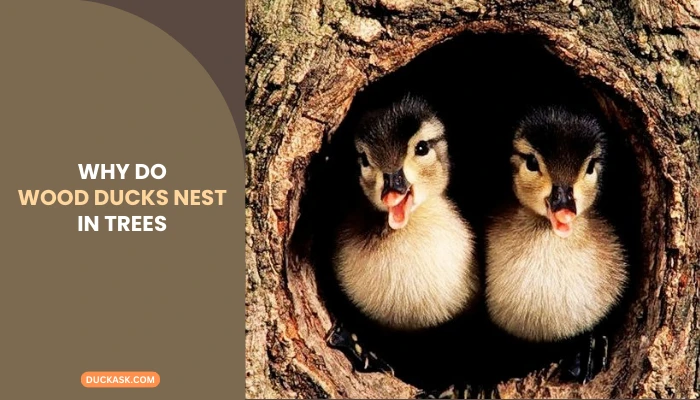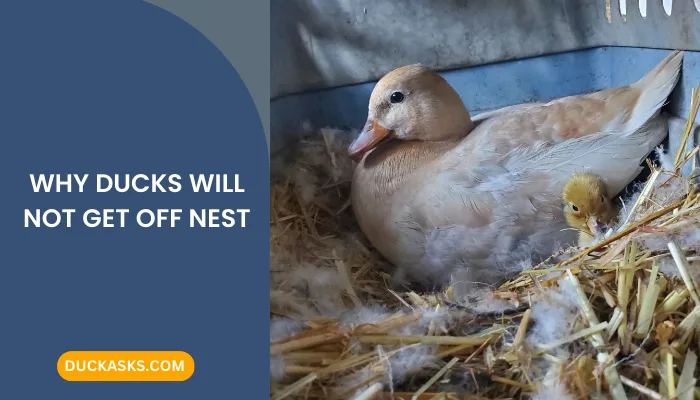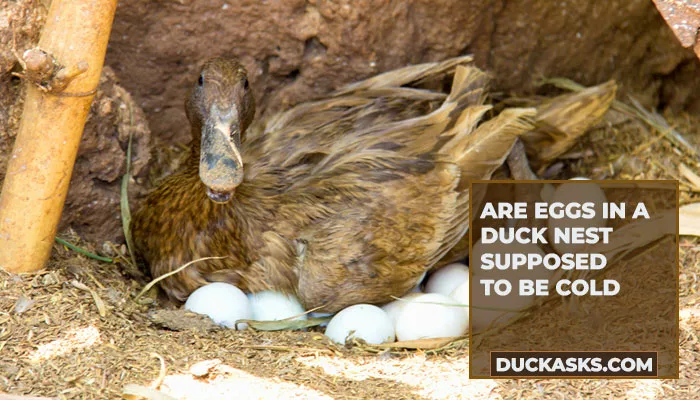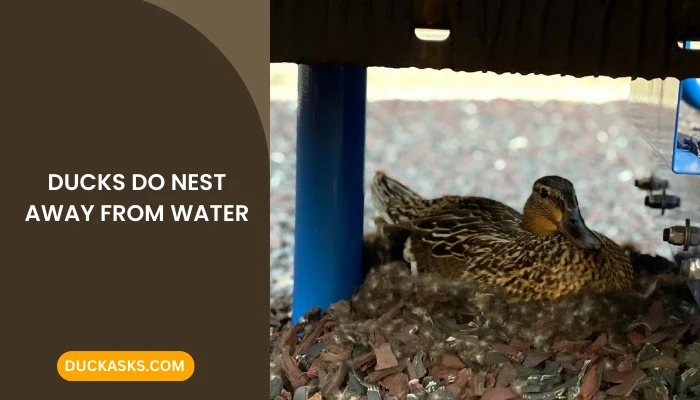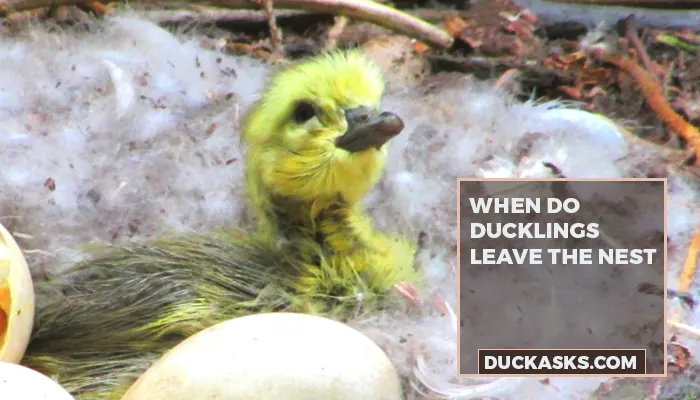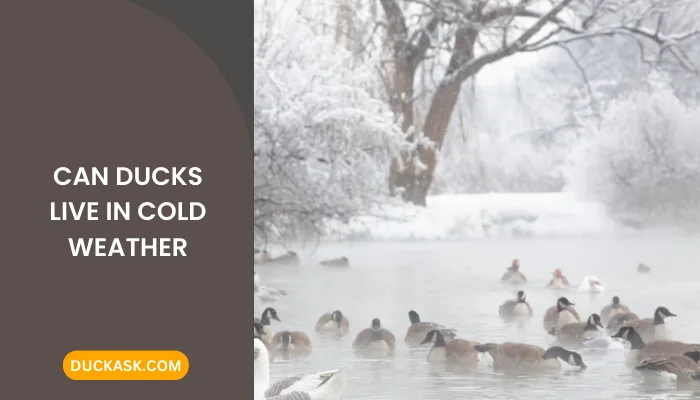Why Do Ducks Live In Water?
Do you ever look at the ducks and wonder why do ducks live in water when they can easily live in lands like hens and roosters? Well, guess what, you’re not the only one.
Just so you know, ducks live in water to serve various purposes of their daily life which include drinking, bathing, nesting, maintaining their plume, hiding from predators, as well as reproducing, feeding, and upbringing. Their unique physical structure supports them to live in water to meet their demands.
And that’s not all. There’s more to know about the reasons for ducks to live in water. We’re here to reveal all those mysteries. Curious? Let’s dive in!
Want to learn more about Ducks Habitat
Do Ducks Need to Live in Water?
Well, even though the presence of water around the place where ducks live is essential for their maintenance and wellness, it is not mandatory.
Because ducks basically need water to maintain and clean their plumage, find food, mate, and hide from predators. Their bodily structure and shape make them good swimmers in both deep and shallow water bodies.
Hence, it’s not like ducks cannot live without access to water, but it restricts their food chain, habitat, and the natural order of lifestyle.
Why Does a Duck Live in a Pond?
Ponds are one of the most preferred water sources for ducks as they provide a suitable habitat for the ducks to thrive and maintain themselves. And ponds have a wide range of aquatic species edible to ducks.
Moreover, food from ponds is much more accessible for ducks than food from any other aquatic source due to ponds’ shallow water levels. Here is a table of foods ducks can from a pond habitat −
| Food Source | Description |
|---|---|
| Aquatic Plants | Duckweed, pondweed, water lilies, water lettuce, etc |
| Insects | Mosquitoes, flies, dragonflies, water beetles, etc |
| Small Fish | When available, ducks may catch and eat small fish |
| Algae | Consumed by ducks, especially when other food is scarce |
| Seeds | Seeds from aquatic plants, grasses, and nearby plants |
| Aquatic Invertebrates | Snails, worms, and other small invertebrates |
| Water Plants | Emergent plants and grasses at the pond’s edge |
| Mollusks | Mussels, clams, freshwater bivalves (diving ducks) |
Besides that, most ponds have a smooth and direct transition from the land. This makes it easier for the ducks to get into it whenever needed.
Therefore, ducks can easily drink, bathe, nest, and maintain their plume in pond water. Also, they can hide from predators because of the reeds and plants residing within the pond.
How Ducks are Adapted to Live in Water?
Ducks have several physical features that help them to adapt to the aquatic environment. Here are some of the notable ones –
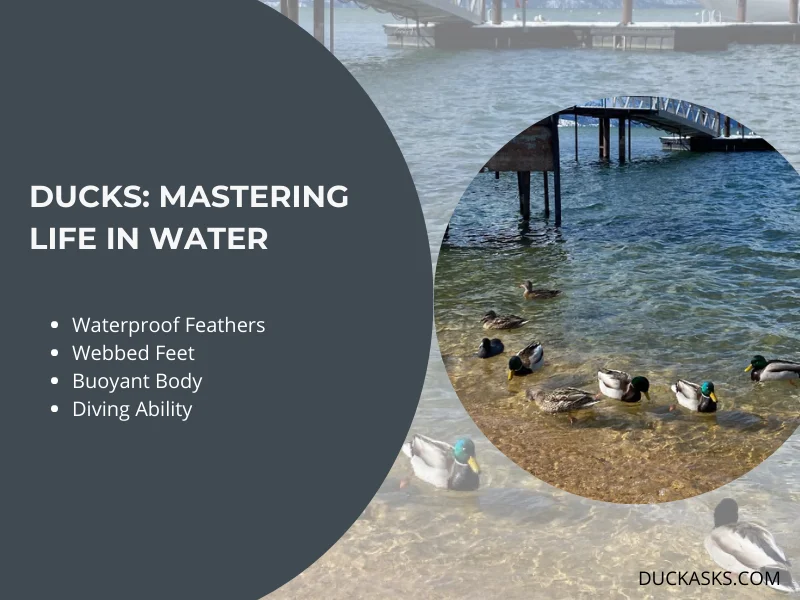
Waterproof Feathers
While most birds get wet in water, ducks due to their waterproof feathers, remain dry while swimming on the water’s surface. This maintains both buoyancy and insulation that helps them stay in water every day for hours.
Webbed Feet
Ducks have webbing between their toes, which works like a paddle. This makes their movement in the water less tedious and more convenient.
Buoyant Body
The shape of the duck is similar to a boat. It has air pockets and is naturally floatable on the water. And so, they don’t need to make any separate effort to float on the water.
Diving Ability
Most ducks are capable of diving. This is an adaptable quality that ducks acquire to get more access to food and protect themselves from swimming predators.
How Do Ducks Benefit from Living in Water?
Living in water is not necessary for the ducks but rather a smart choice. The reasons are the huge number of benefits they get from living in or around water. Here goes a few most basic among them –
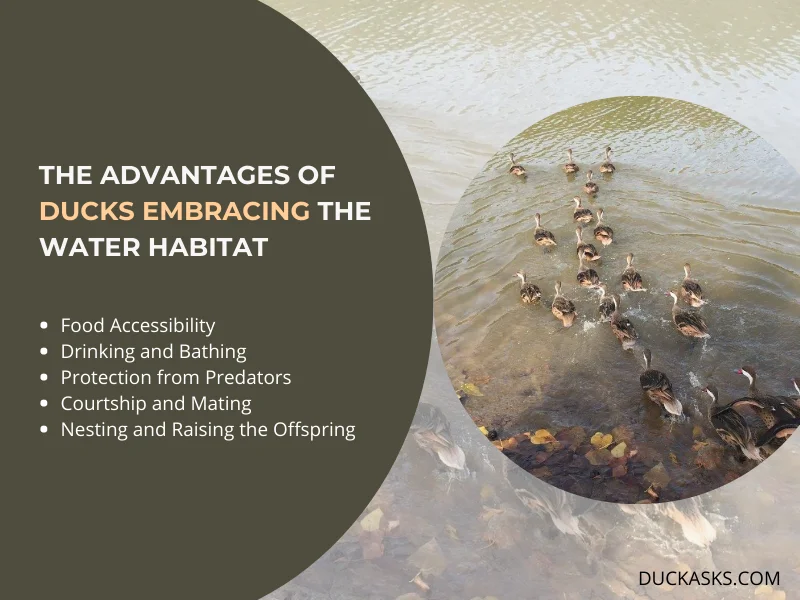
Food Accessibility
As said before, water resources offer bulk food options to the ducks. Aquatic bodies are filled with fishes, insects, microorganisms, reeds, weeds, and other aquatic elements that ducks can exploit as their food source.
Drinking and Bathing
Ducks stay clean and well-maintained by preening themselves, which makes bathing a very important part of their routine life. And so living in water helps them to have all-time access to water to stay both clean as well as hydrated regularly.
Protection from Predators
Ducks are comparatively slow runners on the land but swift swimmers in the water.
And therefore, living in water helps them a lot to survive the threat of land predators. All they do is get into the water and swim far from their reach.
Again, many times they just dive into the water and vanish from the predators’ eyesight, just like here.
Courtship and Mating
Another important contribution of water to the lives of ducks is in their reproduction. Ducks mostly perform their courtship in water.
The male ducks display various water techniques and showcase their plumage to attract the female ones, which is a crucial part of an efficient mating process.
Nesting and Raising the Offspring
Like all other creatures, ducks also pass down the essential practices needed to survive to their descendants. And swimming is one of the most important such practices for them.
Without water accessibility, they cannot teach the baby ducks to swim and raise them well.
How Long Can Ducks Stay in the Water?
Ducks can stay in the water for extended periods of time. On average, they are observed to stay up to 3 to 4 hours in water at a stretch.
However, it depends on various factors such as the type of duck we’re talking about, the type and quality of water, the environment, food and shelter availability, and so on.
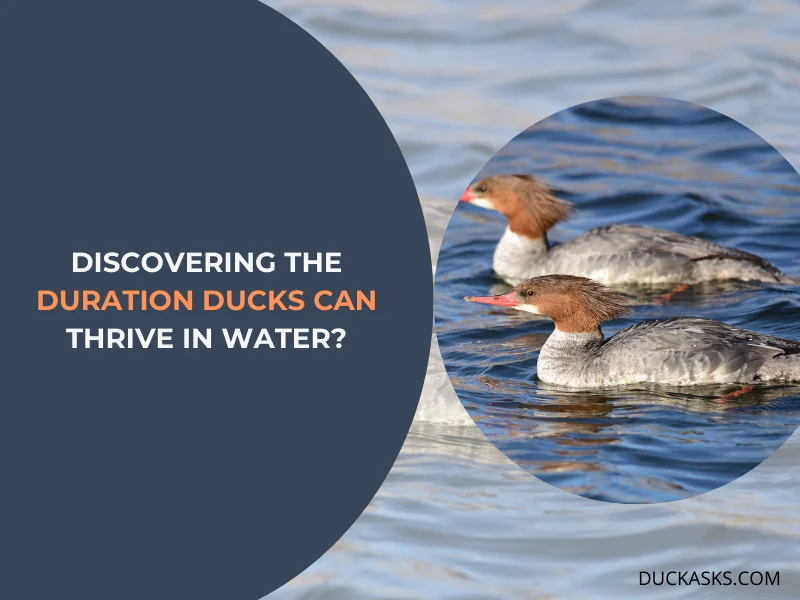
As the ducks have waterproof feathers and oil glands that help their plumage to float and dry quickly, they can effortlessly swim and move and around on the water for hours.
Moreover, ducks are also good divers. They choose diving when they need to hide from a potential threat in water or collect food from a bit of depth.
Nevertheless, the ducks can’t dive in the water for more than a minute; even 20 seconds isn’t too much for a duck’s capacity to dive.
Can Ducks Stay in the Water Overnight?
Ducks are diurnal creatures. No matter how much they spend time in the water during the day time, they usually return to the land right after it’s dark and take a rest on the warm, dry, and cozy surface of the land.
That is when they also preen their feathers and conserve their body heat. Besides, the ducks prefer to maintain a balance between their time in the water and the land.
This balance is essential for their physiological functions and behavioral features. Not maintaining enough water time can negatively impact their health and hygiene and make them become less active.
They opt for well-sheltered places on the land to have a peaceful night-time. However, exceptions are mallards, a duck species that can sleep in both water and land.
Do Ducks Need a Lot of Water: How Much Water is Sufficient for Them
Actually, not necessarily. Water is important to the ducks due to their natural behaviors and well-being. Moreover, if we observe a bit closer to their physiology, ducks have waterproof feathers, webbed feet, and buoyant bodies.
This helps them to swim, dive, and forage in aquatic environments. Therefore, it is indeed a fact that ducks need water for their proper growth and sustenance. That’s how they are biologically designed.
But that doesn’t mean it always has to be a natural aquatic body. Any water arrangement that is deep enough for them to dive their head in should work well.
However, you need to remember ducks that grow near an abundant water surface will always grow healthier compared to the ones that do not have much access to water.
Because as we mentioned a while ago, water bodies contribute to different activities of the day-to-day life of a duck.
How Long Do Ducks Need to Swim?
There is no fixed time frame that ducks follow when it comes to swimming. By nature, they tend to swim every day when they have access to water near them, but that’s not their absolute necessity.
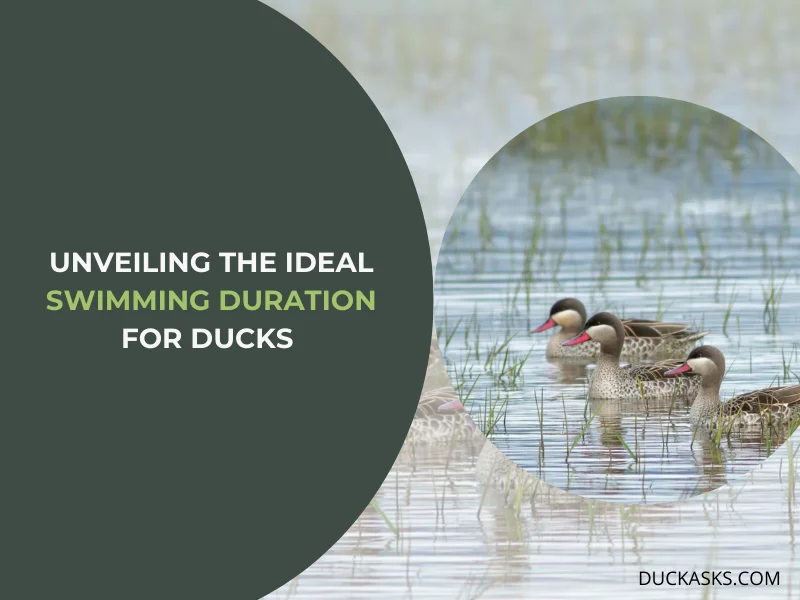
Moreover, the ducks’ social interactions, the weather of the place they live, and their purpose of swimming are the factors that make their required time to swim vary.
Ducks swim as long as they need to fulfill their requirements for finding food, maintaining their feathers, and socializing with other ducks.
But on average, at the very least for 15 to 20 minutes, ducks are required to spend time in the water to maintain a good and healthy lifestyle.
Can Ducks Survive Without Access to Water?
Nope, they can’t. Ducks can go hours without water if needed, but they need water for their survival at the end of the day. And so, any source of water around the place where ducks live is essential.
Moreover, it is said that ducks shouldn’t go more than 8 hours without water because the lifestyle of a duck is dependent on water by a lot of factors.
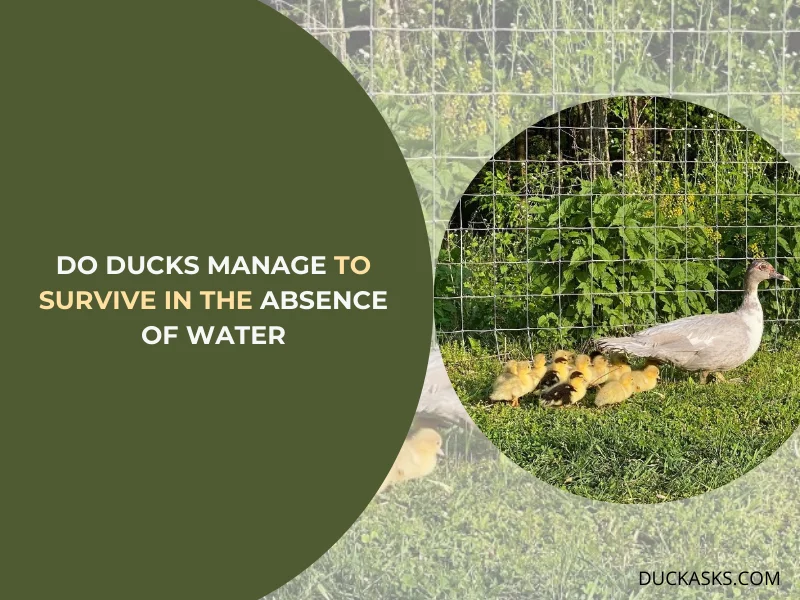
From basic living requirements like drinking, cleaning, and bathing to growth and multiplication through reproduction and upbringing, ducks need water in every stage of their survival.
Therefore, a duck can’t live long if it doesn’t have any access to water. It gets sick and dehydrated after about 8 hours. And thus, ducks’ everyday access to water is extremely important.
Frequently Asked Questions
1. How do ducks survive in cold water?
Ducks are covered with thick layers of feathers that provide them with insulation. However, they also possess a special circulatory system that conserves heat by exchanging cooler blood from the extremities with warmer blood. And that’s what makes them easily survive temperatures as low as 20 degrees of Fahrenheit.
2. How much water do ducks need?
A duck needs at least 6 to 9 square feet of water area for proper development and maintenance. However, this range can differ on the basis of various factors, such as the duck species, environment, and individual requirements.
Conclusion
So, did you enjoy learning about this cute little creature from us? Well, now that you know why do duck live in water, let your duck-loving friends know about it too by sharing this article on your Facebook, Twitter, and Pinterest.
References Link
- https://www.thepoultrysite.com/articles/why-water-access-is-the-secret-to-duck-health
- Inner South Veterinary Centre: www.innersouthvets.com.au
- https://www.spca.nz/advice-and-welfare/article/caring-for-ducks
Image Credits:
- facebook.com/Ema Arius
- facebook.com/Wild Bird Trust
- facebook.com/Richard Branson
- facebook.com/U.S. Fish and Wildlife Service
- facebook.com/English Heritage
- facebook.com/Crystal Loves Calligraphy

